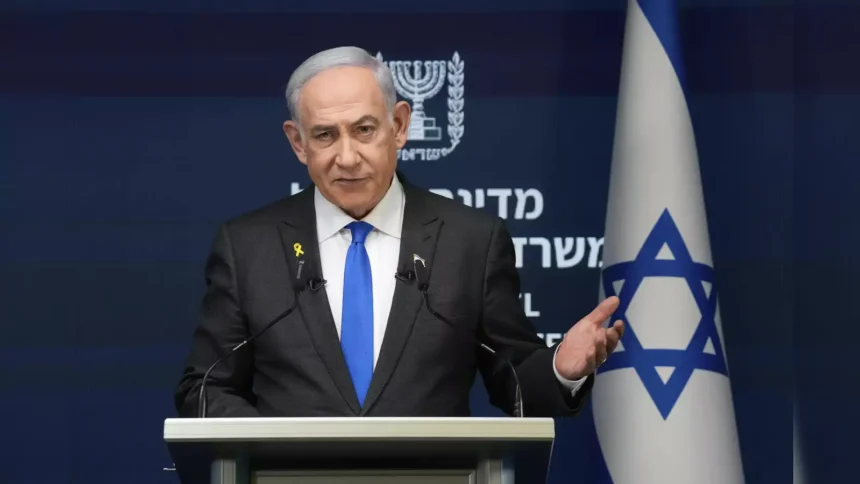In response to a recent missile barrage from Iran, Israeli Prime Minister Benjamin Netanyahu issued a firm warning, calling Iran’s attack a “big mistake” and asserting that Iran will “pay for it.” The situation has escalated as both nations continue to exchange threats, with global powers closely watching the developments.
Netanyahu’s Warning to Iran

Following the missile strikes, Netanyahu took to the social media platform X (formerly Twitter), where he strongly condemned Iran’s actions. He declared, “Iran made a big mistake tonight – and it will pay for it.” The Israeli security cabinet convened late Tuesday to assess the developments and determine a strategic response.
Israeli military spokesperson Daniel Hagari also stated, “This attack will have consequences. We have plans, and we will operate at the place and time we decide.” This suggests that Israel may launch retaliatory strikes, although the specifics of such actions remain undisclosed.
U.S. Response and Warning to Tehran

The United States, which had earlier warned of an impending Iranian missile strike, dismissed the attack as “defeated and ineffective.” White House National Security Adviser Jake Sullivan issued a caution to Iran, warning of serious consequences should the hostilities persist. The U.S. remains closely aligned with Israel in this crisis, signaling that any escalation by Iran could lead to further actions from Western allies.
Iranian Missile Strikes on Israeli Military Bases
On Tuesday, Iran launched a significant missile attack aimed at three Israeli military bases near Tel Aviv and several critical air and radar installations. The Islamic Revolutionary Guard Corps (IRGC) claimed that 90 percent of the missiles hit their intended targets. However, Israeli authorities reported no casualties from the strikes.
Iran characterized the missile barrage as a defensive response to what it called an “attack on the sovereignty” of the nation. This is in reference to the assassination of Hamas leader Ismail Haniyeh in July, which Iran sees as a direct provocation from Israel. The Iranian government claimed the strikes followed a “period of restraint” in the face of increasing Israeli aggression.
Iran’s Counter-Warning to Israel
In a swift reaction to Netanyahu’s warning, the Revolutionary Guards of Iran issued a stark threat, promising “crushing attacks” if Israel retaliates. Iranian officials warned that any military action from Israel would lead to “vast destruction” and advised other nations to stay out of the conflict. Iran’s armed forces cautioned that if provoked, the “interests” of other countries in the region could also face powerful attacks.
Iranian President Masoud Pezeshkian’s Statement
Iranian President Masoud Pezeshkian delivered a strong statement emphasizing Iran’s readiness to defend itself. He said that the missile strikes were a “decisive response” to Israeli “aggression” and urged Netanyahu to recognize that Iran will not be intimidated.
Pezeshkian asserted, “Iran is not a warmonger,” but also made it clear that his country would not tolerate threats. He added, “This is merely a glimpse of our strength. Do not provoke Iran.” The Iranian president’s words underscored Iran’s resolve to defend its sovereignty, while also leaving open the possibility for further escalation if tensions are not de-escalated.
Regional and Global Implications
With tensions between Israel and Iran at their highest point in recent years, the risk of a wider conflict is looming. Both nations are now preparing for potential further military confrontations, while the United States and other global powers monitor the situation closely.
The international community is concerned that this conflict could spill over into neighboring countries, potentially destabilizing the Middle East further. The possibility of intervention from global superpowers, either diplomatically or militarily, remains a crucial factor as the situation develops.









